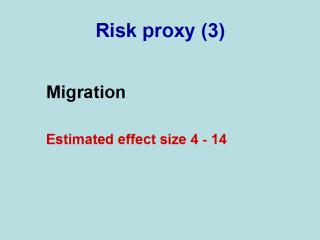| front |1 |2 |3 |4 |5 |6 |7 |8 |9 |10 |11 |12 |13 |14 |15 |16 |17 |18 |19 |20 |21 |22 |23 |24 |25 |26 |27 |28 |review |
 |
A third robust epidemiological proxy variable
is migration; higher rates of schizophrenia are found in migrants. The most
striking findings have come from the UK and Holland, where many studies have
reported an increased incidence of schizophrenia among African-Caribbean and
Surinamese people. Migration may be a proxy for any of a number of possible risk factors. However, drug abuse and misdiagnosis have been largely ruled out as possible explanations. A high genetic predisposition seems unlikely, because the increased risk is not shared by those living in the Caribbean or other originating countries. And risk for schizophrenia seems similar for parents and siblings of white and first-generation African-Caribbean patients. But risk for siblings of second-generation African-Caribbean psychotic probands has been estimated as approximately 7 times higher than that for their white counterparts. This suggests the environmental risk factor operates on this population in the UK but not in the Caribbean. Thus migration has been considered to be a proxy for a number of social (eg isolation and alienation) or physical (eg vulnerability to novel infections or lower prenatal maternal vitamin D) factors. Summary: There is strong evidence that proxy measures, season- and place-of -birth, and migration, are strongly associated with schizophrenia. They are ecological level variables which are thought to reflect another more directly causal risk factor (or factors) which, given current knowledge, is unknown or suspected - but whose evidence is inconclusive. Some of these potential risk factors are discussed in the following slides. |